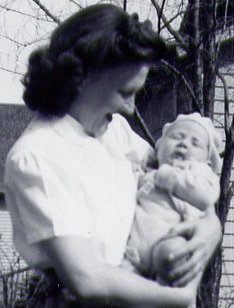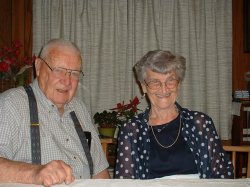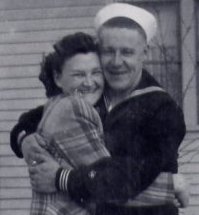| Helen heard about the attack on Pearl Harbor when she was at work at the telephone office in Newport, from another operator. After she heard, she immediately called out to her family's farm to let her family out in Spring Valley know what had happened. |
| HOW DID YOU MEET YOUR HUSBAND? |
| Over the, over the telephone [laughs] Yep, we talked all the time. I used to call a boy I was going with on the lookout and I had to, I had to go to Bob [laugh] he was working at the CC Camp [in Usk] and so I went, you know went through him to get up to where Walt was, and talked to Walt, and he'd listen and then he after while he wouldn't connect Walt and me. [laughs] And he asked me one time oh we were at a dance and he asked me if he picked a gallon of huckleberries if I'd make him a pie and I said sure, so I did and sent it to him in the mail, that's it, a huckleberry pie. Yep, and he said it was good [laugh] We got married in November 1941 15th, after fire season. We had to wait 'til fire season was over before we could get married. |
| WHAT WAS IT LIKE HAVING TO GO THROUGH THE WAR AS A WAR BRIDE? |
| It was, it was a sad, sad day. Really it was a sad day. Yeah, terrible, uh huh and I was very pregnant with, with Rick and I think that's one thing that made it hard for Bob to leave was the fact that I was pregnant. But, it was, it was good as far as Rick and I were concerned, um but it was hard for Bob when he got home. I know it was hard for Bob to, to adjust to the fact you know that we now had a little two year old kid and my interest was, had been totally Rick for two years for it was, it was not easy. |
| THE RATIONING SYSTEM |
| The rationing system for everyone was one of those inconviences of the war, and one would have thought that it would have been especially hard for those young mothers trying to raise a family, and as Helen explains, this was not the case for her: |
| Well you just accepted it, it was not easy. I mean you didn't get shoes every time you turned around. I mean you had to wait and I was lucky because Rick didn't have to have shoes for awhile and so I had two shoe stamps and that was neat [laugh] and um and the meat stamps were, you know we didn't have, we didn't have a lot of meat or sugar or coffee, yeah 'cause it was alright after I had Rick because I had the two you know, it was easier to me than it was then for people who were single and I used to buy cigarettes for my friends 'cause our cigarettes were rationed. Yeah it was an inconvenience and it was a pain in the neck to have to give stamps every time you wanted to buy something you know and those goofy little tokens that they had, you had to spend those tokens. |
| In fact the hardest thing for Helen to live without according to her, was Bob. |
| Like many women, Helen too found that going without decent stockings was difficult, especially when the alternative was rayon, but she too "painted her legs" especially when she had to go to Spokane or someplace special. |
| It was hard, hard going without nylon stockings and I remembered when we heard after the war was over and we heard that Penny's had, had nylon stockings and I, I ran outta the house and was gonna run down to the store and get nylons and I got a pair and they were thick and they wouldn't stay up, they were terrible [laugh] they were they were just awful those first nylons that came. Wasn't easy and at the time you had seams up the back of your legs you know the stockings all had seams up the back and you had to paint that line on there and it was hard to get that straight. I think I just did it when I wanted to get really duded up [laugh] |
| WHAT DO YOU REMEMBER MOST ABOUT THE WAR YEARS? |
| Helen and a group of friends (Doris Broughton Johnson, May Martin, Evelyn Shell) would all get together every Saturday night, to play cards, have fun, and to serve as each other's support system while their husbands were overseas. |
| But what she remembers most is her son Rick who helped her get through those tough times when Bob was away and waiting for the letters from Bob. |
| Well course you always looked forward to letters from the guys and I thoroughly, thoroughly enjoyed my little boy, he was the sweetest little guy and he was the love of the town everybody, everybody liked him. We used to go to the butcher shop and Swan Larson gave him wieners and you know he just, everybody liked him. Howard Kimmel just thought he was the funniest little guy and it was, he was really special. |
 |
| Helen and son Rick, 1944 |
| WHAT DO YOU REMEMBER ABOUT WHEN THE WAR WAS OVER? |
| Well of course when they bombed Japan we were just tickled that it was over, just so happy that it was over. My best moment was when Bob came home. Oh man that was a grand day! And I hadn't cleaned the house and I thought, "Oh my gosh!" Bob's mother was over at my house and I, we saw him walking across the yard and oh tsk it was really, really something! [touched, grabbing Bob's hand] I didn't think that... [chuckle holding his hand] |
| Bob and Helen would spend the years serving the US Forest Service as rangers in many different places around Idaho, Washington, and Oregon, in all moving 24 times. They now live in Lewiston, Idaho. |
 |
| Bob and Helen, 2004 |



